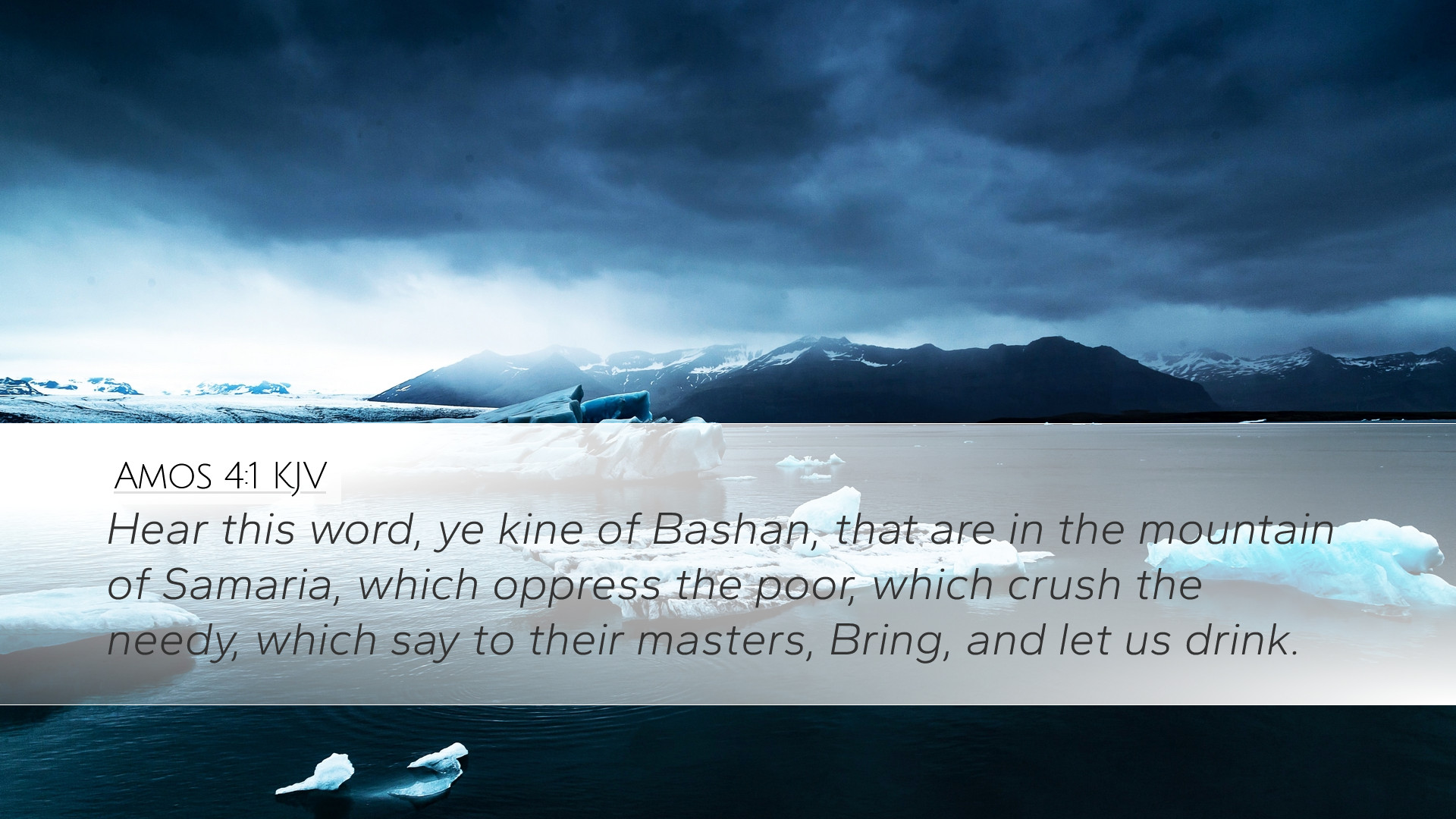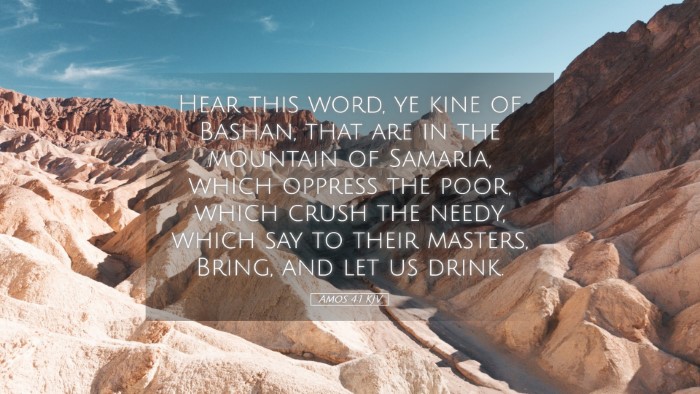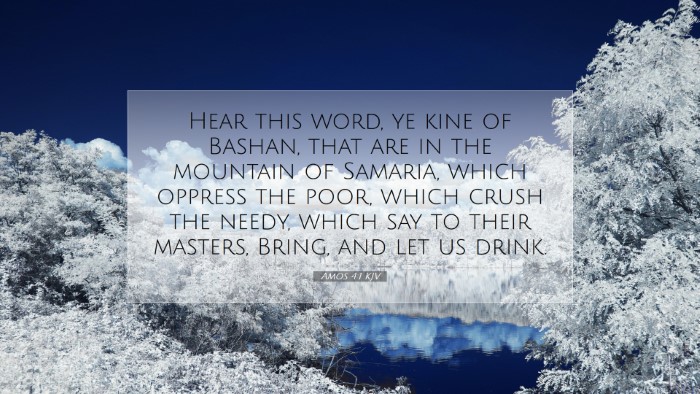Old Testament
Genesis Exodus Leviticus Numbers Deuteronomy Joshua Judges Ruth 1 Samuel 2 Samuel 1 Kings 2 Kings 1 Chronicles 2 Chronicles Ezra Nehemiah Esther Job Psalms Proverbs Ecclesiastes Song of Solomon Isaiah Jeremiah Lamentations Ezekiel Daniel Hosea Joel Amos Obadiah Jonah Micah Nahum Habakkuk Zephaniah Haggai Zechariah MalachiAmos 4:1
Amos 4:1 KJV
Hear this word, ye kine of Bashan, that are in the mountain of Samaria, which oppress the poor, which crush the needy, which say to their masters, Bring, and let us drink.
Amos 4:1 Bible Commentary
Commentary on Amos 4:1
Amos 4:1 states:
"Hear this word, ye kine of Bashan, that are in the mountain of Samaria, which oppress the poor, which crush the needy, which say to their masters, Bring, and let us drink."
Overview
The verse serves as a poignant indictment against the wealthy and powerful women of Samaria, who are likened to the luxurious cattle of Bashan. This metaphor illuminates their opulence, indulgence, and indifference toward the suffering of the poor. In examining this text, three primary themes emerge: the social injustice prevalent in the society Amos addresses, the moral decline associated with wealth, and God's impending judgment.
Historical Context
Amos, a prophet from the Southern Kingdom of Judah, delivered his messages during a time of relative peace and prosperity in Israel. However, this prosperity was built on exploitation and oppression. The phrase "kine of Bashan" underscores the abundance and wealth that characterized the ruling class, while their actions reveal a profound disconnect from the realities of the impoverished.
Insights from Public Domain Commentaries
Matthew Henry's Commentary
Wealth and Indulgence: Matthew Henry emphasizes that the "kine of Bashan" symbolizes those consumed with luxury and self-indulgence. He stresses that such comfortable living has led to a gross neglect of the responsibility that comes with wealth. They are called to "hear this word," indicating a pressing need for awareness of their sins.
Oppression of the Poor: Henry notes the severity of their oppression, capturing the essence of societal injustice where the needs of the vulnerable are overlooked. The luxurious lives they lead do not shield them from accountability for the suffering caused by their greed.
Albert Barnes' Notes on the Bible
Metaphorical Language: Barnes highlights that the choice of the term "kine" (cattle) is deliberate, as it reflects the fatness and idleness of the affluent women being addressed. He draws attention to their complacency and consumes desire to drink and feast while ignoring the plight of others.
Divine Rebuke: Barnes suggests that Amos’ words serve as a stern reminder from God, who sees through any facade of piety these women might have exhibited. Their demand for pleasure contradicted the moral obligations set forth by God’s law.
Adam Clarke’s Commentary
Symbolism of Bashan: Clarke elaborates on the geographical aspect of Bashan, known for its rich pastures and quality cattle. The reference implies that just as these animals thrive in comfort, so too do the wealthy, at the expense of the marginalized.
Sarcasm in Address: Clarke interprets Amos' words with a tone of irony, suggesting that the affluent may have perceived themselves as untouchable due to their status. Yet, the message serves to unveil their moral bankruptcy and imminent judgment.
Theological Implications
The verse challenges the church and believers today to critically evaluate their social justice stances. The conditions characteristic of Amos’s audience have parallels in contemporary society, where wealth often leads to a detachment from the suffering of the poor. It implores those in positions of power to exercise their influence for the welfare of the disenfranchised.
Application for Pastors and Leaders
- Call to Action: Church leaders are urged to remind congregations of their moral responsibilities, particularly in advocacy for the poor and oppressed.
- Awareness and Reflection: Pastors should cultivate environments where discussions about wealth, privilege, and social justice are encouraged.
Study for Theologians and Scholars
- Scriptural Analysis: Scholars are invited to analyze the text within its broader prophetic literature, considering intertextual readings and historical interpretations.
- Ethical Considerations: The verse presents an ethical dilemma regarding wealth and responsibility, catering to discussions in Christian ethics and social responsibility.
Conclusion
Amos 4:1 resonates powerfully across ages, calling both individuals and communities to reflect on their stewardship, justice, and moral obligations. Its message serves as both a warning and a guiding principle, challenging believers to embody a faith that actively seeks justice and compassion for the disadvantaged.


